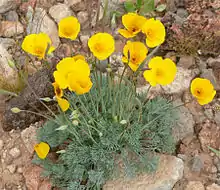| Eschscholzia glyptosperma | |
|---|---|
 | |
| Scientific classification | |
| Kingdom: | Plantae |
| Clade: | Tracheophytes |
| Clade: | Angiosperms |
| Clade: | Eudicots |
| Order: | Ranunculales |
| Family: | Papaveraceae |
| Genus: | Eschscholzia |
| Species: | E. glyptosperma |
| Binomial name | |
| Eschscholzia glyptosperma | |
Eschscholzia glyptosperma is a species of poppy known by the common names desert gold poppy, desert golden poppy, and Mojave poppy.[1]
It is native to the Mojave Desert and Sonoran Deserts of the Southwestern United States, in California, southern Nevada, western Arizona, and southwestern Utah. It is found in desert washes, flats, and slopes, at elevations of 30–1,600 metres (98–5,249 ft).
Distribution
Eschscholzia glyptosperma is an annual herb growing from a basal patch of leaves divided into pointed segments.
It produces erect stems up to about 25 centimeters in height, each bearing a single flower. The poppy flower is bright yellow, with petals one to two and a half centimeters long. It blooms from March to May.
The fruit is a capsule 4 to 7 centimeters long filled with tiny rounded brown seeds.[2][3]

References
External links
- CalFlora Database: Eschscholzia glyptosperma (desert gold poppy, desert golden poppy)
- Jepson Manual eFlora (TJM2) treatment of Eschscholzia glyptosperma
- USDA Plants Profile for Eschscholzia glyptosperma (desert gold poppy)
- UC Photos gallery — Eschscholzia glyptosperma